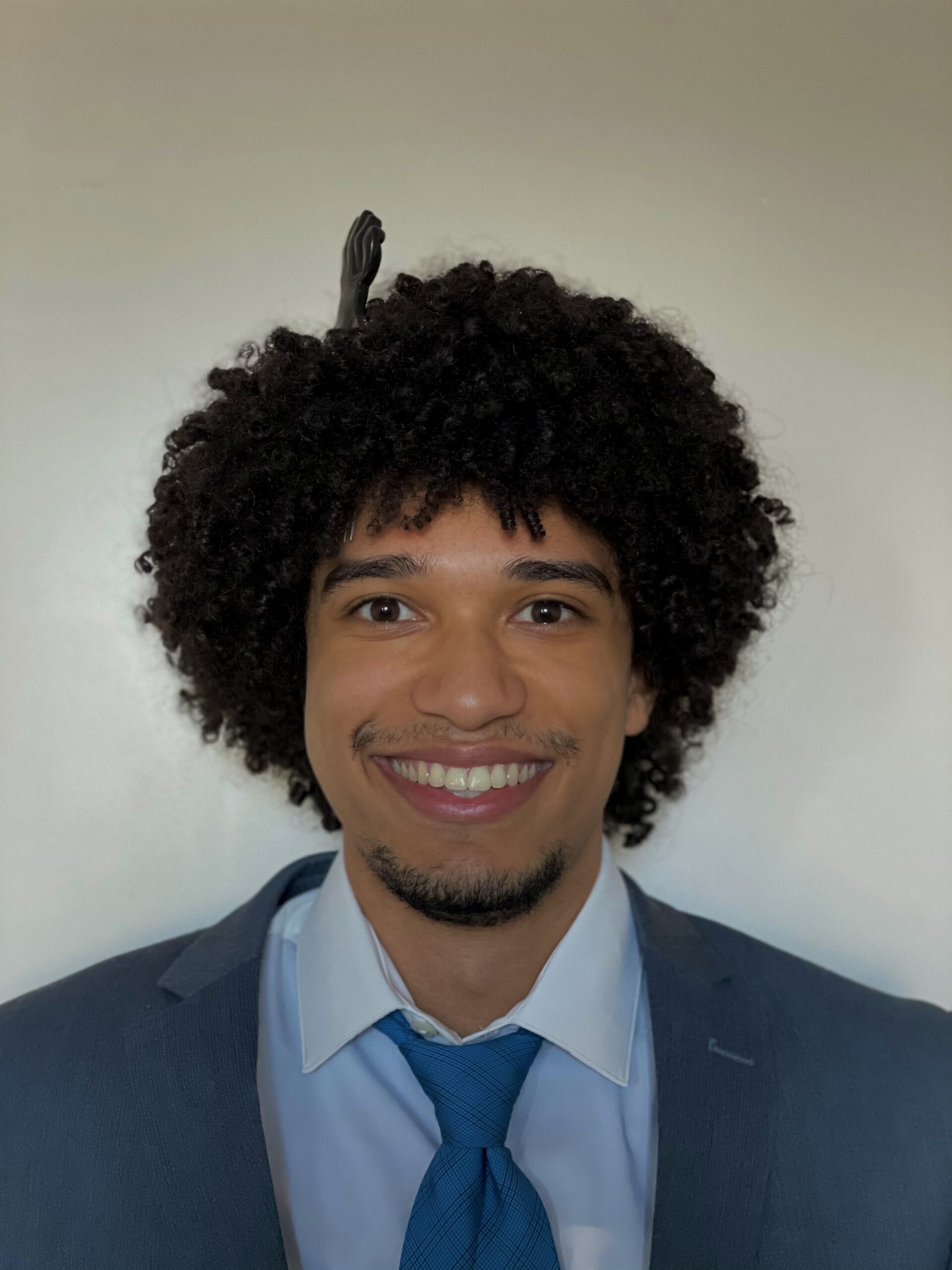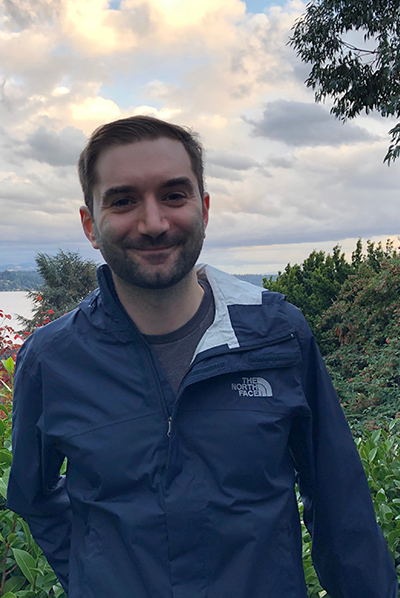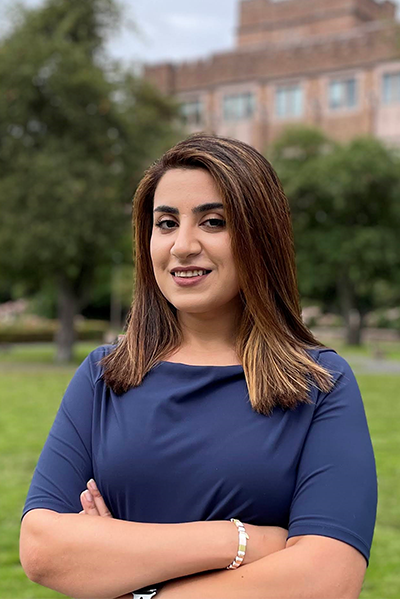November 2, 2022
UW + Amazon Science Hub welcomes inaugural fellows
The UW + Amazon Science Hub is thrilled to welcome our first ever cohort of Amazon Fellows. The fellows, who are all UW doctoral students, will receive three quarters of funding to pursue independent research projects in robotics and adjacent areas in AI. They will also have an opportunity to take part in paid summer internships at Amazon where they can work directly with Amazon researchers to gain valuable industry insight and experience.
Learn more about the fellows’ backgrounds and projects below.
Kyle Johnson

Kyle is researching autonomous robotic platforms for swarms of insect-scale devices that can crawl, roll, walk, jump, glide, or fly. His work demonstrates novel solutions to the size, weight, power, sensing, and communication limitations of commercially available technologies. With onboard power, sensing, and control, his robots aim to culminate in fully autonomous and truly bio-inspired systems. He holds a B.S. in Electrical & Computer Engineering and a M.S. in Computer Science & Engineering from the University of Washington.
Project Title: Enabling Autonomy for Insect-Scale Robots
To create autonomous swarms of insect-scale robots that can fly, glide, run, jump, crawl, and/or roll I have researched bio-inspired structural designs and hybrid actuation solutions to address the size, weight, power, sensing, and communication limitations of robots at the sub-gram and millimeter-scale. To build robots that have onboard power, sensing, and control (autonomous) we leverage a hybrid actuation approach with bio-inspired structural designs.
Utilizing a combination of electromagnetic solenoids, permanent magnets, and the bistability demonstrated in leaf-out origami, we have experimentally achieved crawling, jumping, and gliding locomotion. Utilizing a combination of mm-scale motors and piezoelectric bimorphs, we have theoretically defined the controls for devices that fly, run, and roll.
Michael Murray

Michael is a graduate student at the University of Washington where he works on robotics and artificial intelligence research as part of the Human Centered Robotics Lab, directed by Professor Maya Cakmak. His research interests include robot learning, embodied artificial intelligence, and human-robot interaction. Prior to graduate school, Michael was a software engineer at Amazon where he worked on computer vision for the Amazon Prime Air delivery drone and the Amazon Go cashierless stores. He holds a B.S. in Computer Science from Neumont College and M.S. in Computer Science from the University of Washington.
Project Title: Learning generalizable manipulation behavior from human demonstrations
This project aims to improve industrial robots ability to learn manipulation behavior from humans. We are particularly interested in behavior that can generalize to operate in previously unseen environments and manipulate previously unseen objects. We will explore interfaces for human provided demonstrations and techniques for learning robot manipulation behavior from a combination of large-scale simulation and human provided demonstrations.
Adhyyan Narang

Adhyyan is a 3rd year Ph.D. student in the labs of Lillian Ratliff and Maryam Fazel. He is interested in answering fundamental theoretical questions in supervised machine learning and reinforcement learning, that can provide practical prescriptions. He holds a B.S. and M.S. in Electrical Engineering and Computer Science from UC Berkeley.
Project Title: Multiagent reinforcement Learning for robot co-ordination
In many applications, multiple robots seek to co-ordinate in order to solve tasks that are dynamically specified: for instance, robots on a warehouse floor that need to move products around, with new orders received at any time. Traditional centralized planning approaches cannot account for the dynamic nature of the tasks, and single-agent reinforcement learning solutions scale poorly with the size of the problem. We consider multiagent RL approaches that can trade-off between optimality and runtime efficiency.
Niyousha Rahimi

Niyousha is a member of the Robotics, Aerospace and Information Networks (RAIN) Lab, directed by Professor Mehran Mesbahi. Her current research draws on tools and concepts from control theory, optimization, and machine learning, where she focuses on combining the best of learning approaches with robust/optimal control for autonomous navigation and control. To ensure reliable behavior, her research takes steps toward understanding the tradeoffs and limitations that arise in feedback settings. She holds a M.Sc. in Mechanical Engineering from the University of Washington and a B.S. in Mechanical Engineering from the Sharif University of Technology.
Project Title: Machine Learning in Feedback Systems: Provable Methods for Safe and Robust Autonomy
Feedback synthesis has recently been approached from the perspective of data-guided control. This trend has been encouraged by modern sensing technologies and efficient computational methods. Machine learning is a promising tool for processing complex information, but it remains unreliable for control and decision-making, particularly in safety-critical systems. In general, deep learning does not consider uncertainty representation in regression settings, and deep learning classification models often give normalized score vectors, which do not necessarily capture model uncertainty. To this end, the control community seeks to combine the best of learning with robust/optimal control for autonomous navigation. Towards the goal of ensuring reliable behavior, this project takes steps toward understanding the trade-offs and limitations that arise in feedback settings.
Learn more about the Amazon Fellowship here.